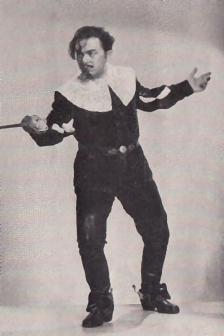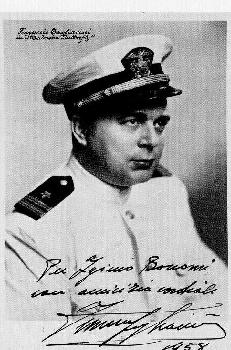Ferruccio Tagliavini
Ferruccio Tagliavini showed musical leanings already as a child: he played the violin, and his singing
in the church choir of Barco, where he grew up, earned him the nickname "Little Caruso". (Later in life, there was not
even a little Caruso in his throat, rather a little Gigli and a little Schipa, fighting for supremacy over Tagliavini's
considerable imitating skills.)
Ferruccio started to work as an electrician, but his father convinced him to also study voice at the conservatories of
Reggio Emilia and Parma. Those studies gradually gained the upper hand on electricity, but were interrupted
by one year in the Italian war on Ethiopia, for which Tagliavini had volunteered; his debut as Rodolfo took place in
Florence on 27 October 1938. The same year, he also made his radio debut. He sang in Venice, Rome, Palermo, a lot in
Florence, and in April 1941 already at the Berlin Staatsoper (as Fenton). On 29 January 1942, he was at La Scala for the
first time (as Almaviva), in 1943 in Amsterdam. In 1942, he shot his first of several films.
After World War II was over, he went to America for a long tour from May 1946 to March 1948: Brasil, Argentina, Mexico,
United States. In the course of that long tour, he made his debuts at the Colón in Buenos Aires (1946), in Chicago
(1946), in San Francisco (1948), and on 10 February 1947, at the Met (as Rodolfo); he sang at that theater frequently
until 1952, and occasionally until 1962.
In the 1950s, his career peaked; he sang also at the Paris Opéra and at Covent Garden, in Japan, in Australia,
Vienna, Stuttgart, Antwerp or Brussels. By singing heavier roles like Riccardo, Boito's Faust, or Cavaradossi, he started
damaging his purely lyrical voice. From 1965, his career slowed down considerably. He sang his last stage performance in
1970, his last concert as late as 1984.
Reference 1: Treccani, Dizionario Biografico degli Italiani, vol 94, Roma 2019; reference 2: Kutsch & Riemens;
reference 3; reference 4
I would like to thank Thomas Silverbörg for the recordings (Nostalgia de amores, Fedora) and picture (top). I would like to thank Paolo Cavassini for the recording (Tosca). La bohème – Bologna, March 1938 Il campiello – Venezia, Fenice, 8 February 2939 Rigoletto – Torino, della Moda, 20 May 1939 L'amico Fritz – Firenze, Comunale, 24 October 1939 I quattro rusteghi – Trieste, Verdi, 8 March 1940 Semiramide – Firenze, Comunale, 28 April 1940 Die Zauberflöte – Firenze, Pergola, 30 April 1940 Falstaff – Torino, EIAR, 23 June 1940 Il trionfo dell'onore – Siena, dei Rozzi, 18 September 1940 La sonnambula – Genova, Carlo Felice, 2 February 1941 L'arlesiana – Roma, dell'Opera, 13 February 1941 La locandiera – Roma, dell'Opera, 17 March 1941 Armida – Firenze, Comunale, 14 May 1941 Il barbiere di Siviglia – Roma, EIAR, 16 December 1941 La buona figliola – Roma, dell'Opera, 20 January 1942 L'elisir d'amore – Milano, Scala, 14 April 1942 Werther – Firenze, Comunale, 10 October 1942 Manon – Venezia, Fenice, 19 March 1943 Don Pasquale – Roma, dell'Opera, 30 December 1943 Faust – Roma, dell'Opera, 25 March 1944 Madama Butterfly – Roma, dell'Opera, 20 May 1944 Tosca – Roma, Quirino, 25 July 1944 Lucia di Lammermoor – Roma, dell'Opera, 8 October 1944 I pescatori di perle – Roma, RAI, 13 January 1945 La traviata – New York, Met, 14 February 1947 Chopin – Rio de Janeiro, Municipal, 13 September 1949 Adriana Lecouvreur – Rio de Janeiro, Municipal, 28 July 1950 Don Giovanni – New York, Met, 30 November 1950 Un ballo in maschera – Paris, Opéra, 1 July 1951 Mefistofele – Milano, Scala, 12 April 1952 Fedora – Milano, RAI, 10 July 1954 Lodoletta – RAI, 21? December 1957 La guerra/Le campane (both by Rossellini, first staged performance of Le campane) – Cairo, 27 February 1961 Reference: Franco Costi: Ferruccio Tagliavini, Gianni Bizzocchi Editore, 2004 The Record Collector, volume 29, December 1984 (very poor research job) Umberto Bonafini: Ferruccio Tagliavini, l'uomo, la voce, Magis Editori, 1993 Ciro Tedeschi: Ferruccio Tagliavini: Il signore del canto, Edizioni XX Secolo S.A., Roma, 1942 A cura di Giorgio Gualerzi: Ferruccio Tagliavini: Un ragazzo che voleva vivere così, Cassa di Risparmio, Reggio Emilia, 1988 I would like to thanks Juan Dzazópulos for several corrections and addenda. |

